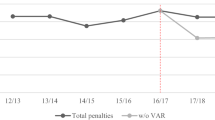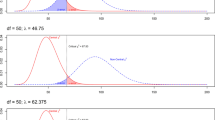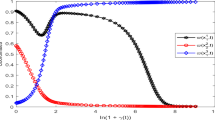Abstract
This paper reports an experiment designed to detect the influence of strategic uncertainty on behavior in order statistic coordination games, which arise when a player’s best response is an order statistic of the cohort’s action combination. Unlike previous experiments using order statistic coordination games, the new experiment holds the payoff function constant and only changes cohort size and order statistic.
Similar content being viewed by others
References
Broseta, B. (1993a). Strategic uncertainty and learning in coordination games. UCSD discussion paper 93-34, August 1993.
Broseta, B. (1993b). Estimation of a game-theoretic model of learning: an arch approach. UCSD discussion paper 93-35, August 1993.
Conover, W. J. (1980). Practical nonparametric statistics (2nd ed.). New York: Wiley.
Crawford, V. P. (1995). Adaptive dynamics in coordination games. Econometrica, 63(1), 103–144.
Epps, T. W., & Singleton, K. J. (1986). An omnibus test for the two sample problem using the empirical characteristic function. Journal of Statistical Computation and Simulation, 26, 177–203.
Haltiwanger, J., & Waldmann, M. (1985). Rational expectations and the limits of rationality. American Economic Review, 75(3), 326–340.
Stahl, D. O. (1993). Evolution of smart n players. Games and Economic Behavior, 5(4), 604–617.
Teichroew, D. (1956). Tables of expected values of order statistics and products of order statistics for samples of size twenty and less from the normal distribution. Annals of Mathematical Statistics, 27, 410–426.
Van Huyck, J. B., Battalio, R. C., & Beil, R. O. (1990). Tacit coordination games, strategic uncertainty, and coordination failure. The American Economic Review, 80(1), 234–248.
Van Huyck, J. B., Battalio, R. C., & Beil, R. O. (1991). Strategic uncertainty, equilibrium selection, and coordination failure in average opinion games. The Quarterly Journal of Economics, 106(3), 885–911.
Van Huyck, J. B., Cook, J. P., & Battalio, R. C. (1994). Selection dynamics, asymptotic stability, and adaptive behavior. Journal of Political Economy, 102(5), 975–1005.
Van Huyck, J. B., Cook, J. P., & Battalio, R. C. (1997). Adaptive behavior and coordination failure. Journal of Economic Behavior and Organization, 32, 483–503.
Author information
Authors and Affiliations
Corresponding author
Additional information
R.C. Battalio deceased.
Related research available at http://erl.tamu.edu
Electronic Supplementary Material
Rights and permissions
About this article
Cite this article
Van Huyck, J.B., Battalio, R.C. & Rankin, F.W. Evidence on learning in coordination games. Exp Econ 10, 205–220 (2007). https://doi.org/10.1007/s10683-007-9175-z
Published:
Issue Date:
DOI: https://doi.org/10.1007/s10683-007-9175-z




